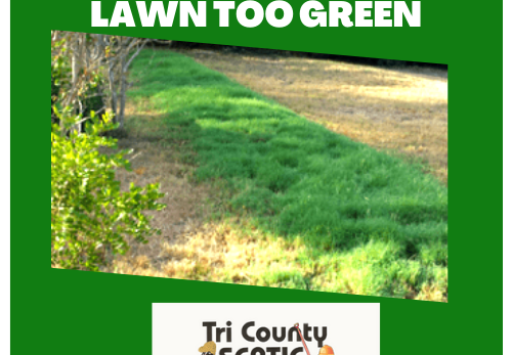If you have lush, green grass growing over your septic tank, it could mean that the hydraulic system is not working properly. The trenches in your leach field are filling with liquid waste because the soil cannot absorb any more water from your house. That wastewater is full of rich nutrients that give the grass over your septic system a good dose of fertilizer and turn it a bright shade of green. This is a sign of trouble with your septic. You want to call the experts at Tri-County Septic for them to come and investigate why your grass is quite so lush and bright green.
On the other hand, brown grass over your septic tank is actually a good thing. It means your septic system is working the way it is supposed to. Brown grass appearing during dry or warm weather usually indicates that your grass is not getting enough water. It is because the soil over your tank is not as deep as the soil over the rest of your lawn. Brown grass over the septic does not need watering, this is a good sign! It means your septic system is working the way it is intended to do.
Watering the brown grass with additional water reduces your leach field's ability to absorb wastewater from your house and may even lead to the failure of your system. Even though the grass turns brown because there's not enough soil to support its root system, you should not add topsoil over your tank. The system needs oxygen to help waste dissipate, adding water does not help this task.
Oxygen helps your septic field to function:
-
- Septic tanks send liquid waste from the tank through a series of drain lines positioned throughout the leach field.
- Microbes in the soil filter and clean the liquid waste before it reaches the ground water.
- These microbes need oxygen in to do this work effectively. Compacted soil, or wet, soggy soil, has less oxygen in it.
- Adding additional soil reduces the amount of air available to the microorganisms that break down the wastes in your system.
- Maintaining your septic system saves you money!
When planting over your septic system, remember not to dig too deep. Drain lines can be as close as 6 inches from the top of the soil. Always wear gloves when working with soil over the septic system to reduce exposure to harmful organisms that may be present.
Plants that do not need much in the way of maintenance or watering are:
-
- Ornamental grasses
- Catmint Black-eyed
- Susan Verbena
- Grass
Planting any plant that can be eaten on a septic field is a poor choice. Leave those plants for a garden located away from the septic or drainfield.
Remember to call the experts at Tri-County Septic for lush grass or any other concerns with your septic system!
